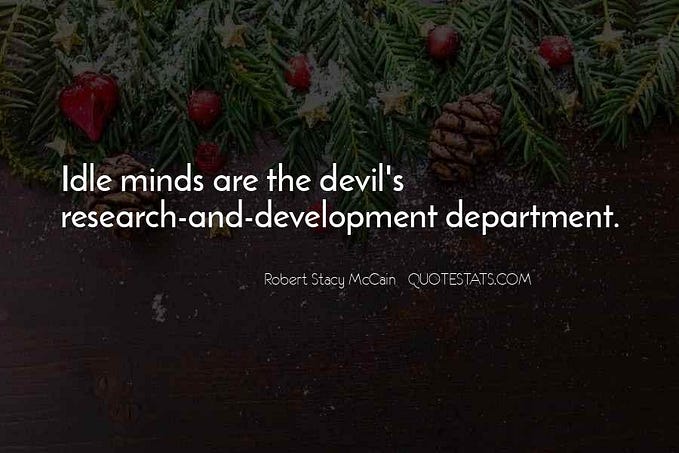Secret of Being Eternal

But how can “being nothing” last forever, as it seems paradoxical that a thing that doesn’t even exist can not only last but also forever.
The answer is very very simple: everything that exists or that can be perceived by us in the physical or tangible world is ephemeral, transient, and thus misleading: Fame, power, wealth, beauty, youth, pleasure, romance, self-praise — you name it, anything. And chasing these illusions is like seeing a mirage (that looks like water) in the desert, during a hot summer day, that constantly remains ahead just a few feet in front of you. Thus you never reach there, in spite of continuously chasing the supposed oasis to quench your thirst. In other words,in this space and time everything is fleeting and fragile. That is why as most people say and agree too,“Nothing” lasts forever” (pun intended).
But we often tend to ignore the reality and constantly keep chasing the things to fill the void within. We keep ourselves busy, struggle to distract ourselves to feel good or rewarded and make sense of the world around us. But in the end we find ourselves exhausted and temporary excitement and feelings of joy and achievement soon evaporate in the thin air. Consequently after a temporary high, we are back to the square one: feeling pain, sadness, confusion, guilt, shame, loss, meaninglessness, and grief etc.
However, if, like King Lear, we come to terms with “nothingness,” we can find our true and authentic self and thus find redemption or a sense of salvation that will last forever. This is also the essence of many Eastern philosophies where the concept of “nothingness” is characterized by an egoless (or humble) state of being in which one fully realizes one’s own small part in the cosmos, but not really insignificant as in the words of Rumi, every drop is, in fact, an ocean in itself.

However, if drop does get separated from the ocean, then it disappears in the oblivion. In other words, the quote makes it evident that when we go beyond our so-called individual self or experience, we become something (or part of a) much larger than we are.
It can be best understood in the words of Jean Paul Sartre who regards “Nothingness” identical to “a worm” that lies coiled in the heart of being. Here is his original quote:
“Nothingness lies coiled in the heart of being — like a worm.”
( Jean-Paul Sartre, Being and Nothingness)
In other words, in spite of constantly striving to define ourselves (in individual or egoistic sense), to assign meaning to our lives, to gain recognition, nirvana etc. we find that our true selves elude us. Thus, according to an anonymous quote, it is in the nothingness that we can find solace in the freedom to define us.
Similarly, according to Taoist philosophy, however real this world might seem, its main characteristic is impermanence, whereas the Tao (which translates as “way,” “path,” or “route,") has a permanence that cannot be described, predetermined, or named. In this way the Tao is different from any thing that can be named. It is nonexistence, in other words, nothing. According to Wikipedia, “the Tao is a cosmic force that can’t be named or described, is the natural harmony between all living things, and the way they all move together. Taoists thought that if someone “forgot themselves”, and let go of intentions, they would be able to “move effortlessly” (wu wei, or “non-action”), and be in harmony with the Tao, like the animals, plants, and everything else. This harmony is the ultimate goal of Taoism.
This philosophy is also called “Wu Wei” which means — in Chinese — non-doing or ‘doing nothing’. It sounds like a pleasant invitation to relax or worse, fall into laziness or apathy. It thus involves acting without desire, where desire is understood as the force that causes people and things to behave unnaturally.

In simple words, when we stop chasing the illusions to “become something,” we discover the eternal reality behind “smoke screen” of our desires, ambitions, emotions as well as tension(s). Thus we discover, our true self and also the purpose of life and become eternal. This point has also been, very aptly, illustrated by Rumi, in following words:
“I lost everything, I found myself.”
This can be best understood by pondering over the fate of “King Lear” who after losing everything — his status, his family, his mind — learns the value of Cordelia’s Nothing, my lord. Cordelia and King Lear exchange these words when Lear questions about her (Cordelia’s) love for him:
“Nothing, my lord.”
“Nothing?”
“Nothing.”
“Nothing will come of nothing: speak again.”
Throughout the play, many characters fear the idea of having no power and wealth and must lose everything to truly value what they had.
Another example is F. Scott Fitzgerald’s novel “The Great Gatsby” (one of the most important and well known works in the American literary cannon), where the protagonist of the novel, symbolizes the American dream (or illusion) in the 1920s being unaware of the rotten core hidden below its dazzling exterior. Thus he was willing to do whatever it took to get what he wanted, but at the cost of total disillusionment after having discovered that all the things i.e. money, power, prestige, love, were truly beautiful illusions. Gatsby, like other corrupt wealthy people, also did not become wealthy by working hard and making his money honestly, rather than, he bootlegged and did illegal things to become rich and establish connections with so-called upper (or old money) class. But even then his failure to pick up on subtle social signals results in his ultimate rejection even by her so-called beloved Daisy ( with the aura of charm, wealth, sophistication, grace, and aristocracy) who marries Tom because of his wealth and because they both belong to the same “old money” class. And also because she couldn’t wait any longer, had zero patience and as stated in the novel “she wanted her life molded now.” But Tom and Daisy Buchanan too do not have a loving relationship as the realities of the marriage, including Tom’s multiple affairs, had worn on her. Tom even cheated on her soon after their honeymoon.
They both, as we come to know, married to each other only for image concerns: Tom wants to have a young, pretty wife that makes him look good, and Daisy like the money and comforts and a lifestyle that Tom provides.However, Daisy uses these materialistic items as an escape from reality or her real life problems. She is corrupted and brainwashed by this lavish way of life. Thus Gatsby’s vision of Daisy as a pure woman who truly loves only him also proved to be a lie. And tragically, many people who came to Gatsby’s wildly lavish parties failed to attend his funeral.
And, more tragically, even Daisy and Tom, could not achieve happiness either, in spite of being wealthy, cultured, and enjoying the benefits of affluence, opportunities, and social respect.

Conclusion:
As someone has aptly remarked, “It is in the realm of nothingness, that mind finds liberation from the shackles of worldly attachments and find eternity in each moment.” Or as Buddha puts it: “Enlightenment comes when the noise dies, when the number and words vanish” and it is that enlightenment which guides us towards the eternal truth.
In short when you have (or desire) nothing, you have everything. Or as in the wu-wei “taking no action, loving tranquility, engaging in no activity and having no desires — all lead to natural transformation, correctness, prosperity and simplicity. More precisely, what you seek outside is already within you.
The following (version) of folk tale encapsulates the whole idea in few simple words:
“The Happy Man’s Shirt” — An Italian tale
“A king had an only son that he thought the world of. But this prince was always unhappy. He would spend days on end at his window staring into space.
“What on earth do you lack?” asked the king. “What’s wrong with you?”
“I don’t even know myself, Father.”
“Are you in love? If there’s a particular girl you fancy, tell me, and I’ll arrange for you to marry her, no matter whether she’s the daughter of the most powerful king on earth of the poorest peasant girl alive!”
“No, Father, I’m not in love.”
The king issued a decree, and from every corner of the earth came the most learned philosophers, doctors, and professors. The king showed them the prince and asked for their advice. The wise men withdrew to think, then returned to the king. “Majesty, we have given the matter close thought and we have studied the stars. Here’s what you must do. Look for a happy man who’s happy through and through, and exchange your son’s shirt for his.”
That same day the king sent ambassadors to all parts of the world in search of the happy man.
A priest was taken to the king. “Are you happy? asked the king.
“Yes, indeed, Majesty.”
“Fine. How would you like to be my bishop?”
“Oh, Majesty, if only it were so!”
“Away with you! Get out of my sight! I’m seeking a man who’s happy just as he is, not one who’s trying to better his lot.”
This the search resumed, and before long the king was told about a neighboring king, who everybody said was a truly happy man. He had a wife as good as she was beautiful and a whole slew of children. He had conquered all his enemies, and his country was at peace. Again hopeful, the king immediately sent ambassadors to him to ask for his shirt.
The neighboring king received the ambassadors and said, “Yes, indeed, I have everything anybody could possibly want. But at the same time I worry because I’ll have to die one day and leave it all. I can’t sleep at night for worrying about that!” The ambassadors thought it wiser to go home without this man’s shirt.
At his wit’s end, the king went hunting. He fired at a hare but only wounded it, and the hare scampered away on three legs. The king pursued it, leaving the hunting party far behind him. Out in the open field he heard a man singing a refrain. The king stopped in his tracks. “Whoever sings like that is bound to be happy!” The song led him into the vineyard, where he found a young man singing and pruning the vines.
“Good day, Majesty,” said the youth. “So early and already out in the country?”
“Bless you! Would you like me to take you to the capital? You will be my friend.”
“Much obliged, Majesty, but I wouldn’t even consider it. I wouldn’t even change places with the Pope.”
“Why not? Such a fine young man like you . . .”
“No, no, I tell you. I’m content with just what I have and want nothing more.”
“A happy man at last!” thought the king. “Listen, young man. Do me a favor.”
“With all my heart, Majesty, if I can.”
“Wait just a minute,” said the king, who, unable to contain his joy any longer, ran to get his retinue. “Come with me! My son is saved! My son is saved! And he took them to the young man. “My dear lad,” he began, “I’ll give you whatever you want! But give me . . . give me . . .”
“What, Majesty?”
“My son is dying! Only you can save him. Come here!”
The king grabbed him and started unbuttoning the youth’s jacket. All of a sudden he stopped, and his arms fell to his sides.
The happy man wore no shirt.”
Kindly Support:
I am unable to earn a penny in spite of being eligible (after a long time) for “Medium Partner Program” that looks more like a writers attracting gimmick than anything else. Therefor I need support from the generous readers like you who might find my writing sensible and thus useful. For this you have to simply click the link below and buy any of my e-books that may give you new insights into the current affairs/problems being faced by the humanity and their possible solutions. Thanks.
References:
i) https://www.bookey.app/quote-book/being-and-nothingness
ii) https://www.123helpme.com/essay/Failure-of-the-American-Dream-in-Fitzgeralds-11907
iii) https://blog.prepscholar.com/the-great-gatsby-theme-love-relationships










